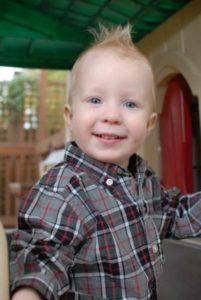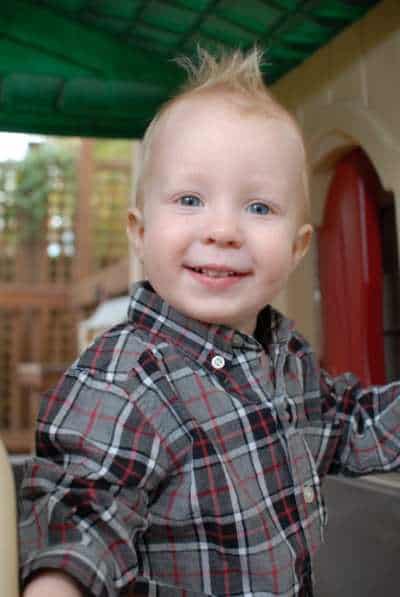How to Be a Better Parent to Your Explosive Child
“He’s a monster!” said my sister one night as we tried to enjoy a small town Christmas parade and festival. Jake had already had multiple meltdowns and there was no end in sight. He was about 2 years old.
 He didn’t like to sit … he wanted to run and explore, say Hi to people and pet puppies and TOUCH EVERYTHING. Instead we confined him in the stroller and held him and tried to bribe him with promises of treats later if he would be good now – ha! that never works🙄
He didn’t like to sit … he wanted to run and explore, say Hi to people and pet puppies and TOUCH EVERYTHING. Instead we confined him in the stroller and held him and tried to bribe him with promises of treats later if he would be good now – ha! that never works🙄
It was SO hard to go anywhere with him. I usually opted to stay home. At home I could be in control of the environment and the schedule.
A regular and consistent schedule was super important to Jake feeling safe and secure. He needed to know what was going to happen and what to expect. And under those circumstances, overall he was happy and good.
Unfortunately, Jake had no middle emotional ground. He was either happy or ballistically mad and there was nothing in between.
I read many parenting books and tried oh so many different ways to help him learn to manage his temper and make good choices.
The traditional methods of discipline that worked so well with his sister were useless with Jake.
If his sister asked me for 5 pieces of candy, I would say, “You can have one piece of candy or none.” And she would say, “One” and smile 😊
If Jake asked me for 5 pieces of candy, I would say, “You can have one piece of candy or none.” He would scream and cry and scream some more 😱
I was super consistent and I never gave in to the crying and the tantrums. But Jake didn’t learn to behave. A lot of times he could and did behave. But there were too many times when he didn’t and the outbursts were not small when they happened. On those occasions, I remember shaking my head in disbelief, “How have you not figured this out yet?”
I remember feeling the outside world very much judged me and Jake. I know many a casual observer, and family members too, thought I was not doing a very good job of parenting and that Jake was a manipulative little devil.
I sought help in more books and came upon The Explosive Child by Dr. Ross Greene. This book was such a relief! Finally, someone who deeply understood “challenging kids” and their confused and worn out parents.
The first thing Dr. Greene addressed in the book was SO monumentally important and helpful to me – “Kids do well if they can.” It’s so basic but SO NOT what most people understand to be true about kids.
People assume if you are a consistently good parent, your kids will behave well. And if your kid doesn’t behave, it’s because there’s something wrong with him. He’s choosing to be bad for some reason … to get attention, to wear you down, to make you feel sorry for him. And you mom … you better figure out some magic way to “fix” him.
I was so grateful to find Dr. Greene and his simple philosophy: “Kids do well if they can.” He reinforced what I already knew … Jake was not being difficult on purpose and he wasn’t a bad kid.
Dr. Greene helped me understand Jake wasn’t difficult because he was stubborn, stupid, manipulative, or an alien baby switched at birth 😂 . He was difficult because he was lacking the skills needed to navigate stressful, anxious, frustrating situations.
He further explained, “Challenging kids are lacking the skills of flexibility, adaptability, frustration tolerance, and problem solving, skills most of us take for granted.”
The book is an excellent resource and I highly recommend it to parents with kids who struggle with extreme frustration and explosive tempers. Unfortunately for us, the problem-solving methods Dr. Green teaches require more advanced verbal communication skills than Jake had at the time (he was 9 but also delayed so more like 7).
I implemented the things I could and it was a huge step in the right direction, but this book was not THE magic solution for us.
Temper and poor impulse control continued to be major stumbling blocks for Jake for years.
Thank God we were blessed with amazing teachers who had an understanding of Jake’s unique struggles and sweet character and who looked for the good instead of deciding he was too much trouble.
I took him to occupational therapy, behavioral therapy, and eventually to the psychiatrist to see if medication would help.
In the end, the biggest change came last year, in 2019 when Jake was 13 years old.
I found a new behavioral therapist and this man instantly understood Jake. He diagnosed him with DCD (Developmental Coordination Disorder) in the first session. (Read more about DCD here: http://facebook.com/dcdawareness.tx) He had a rapport with Jake that no other therapist ever had.
He also gave ME specific support and help navigating the unique challenges of parenting a child with DCD. I’ve come to understand that while Jake is 14 years of age, emotionally, socially, and developmentally he is more like a 9 year old. So I have to adjust my expectations and parent Jake like he is 9, not 14.
One of the most helpful tools the therapist gave me was a book called 1-2-3 Magic by Dr. Thomas Phelan. Applying the simple discipline methods in this book totally changed the anxiety level in our home and it was honestly magical🌟
The book is not specifically for kids with DCD or ADHD or any other diagnosis. The parenting methods explained in the book are methods that would typically be utilized with children much younger than 14 years old.
But, Jake is emotionally more like 9 so these simple methods (that don’t require a lot of talking and reasoning) are better for him.
This book taught me the most important step in helping Jake to stay calm is for ME to stay calm and use a calm voice no matter how irritated, frustrated, or angry I feel. I already knew this from years of trial and error. I had learned raising my voice, even one iota, inhibited and oftentimes completely shut down all communication from that moment on.
The second step – do NOT over-talk or over-explain everything (as parents tend to do 😳).
I implemented the simple counting method which notifies Jake he’s on rocky ground (for talking back, not listening, refusing to turn off an electronic device, etc.) by saying, “You are on a 1” while holding up the number one on my hand. Something about saying the words while also giving a visual cue made a big difference as compared to simply counting. Also, you have to take action on 3. There’s no 4 or 5 or “I mean it this time!”
This method gives him 2 chances to think and make a good decision, to stop the offensive behavior before getting to 3. And if you do get to 3, there is a predetermined consequence, usually a time out in another room. When the time is up, no talking. You just go back to your day.
Most of the time, a separation and a cooling off period is all that is needed.
It worked amazingly well! The number of meltdowns drastically decreased only a few days into implementing the 1-2-3 method.
If you are having any behavioral issues with your child, I highly recommend this book 🤓🧐🤓. (It comes as a DVD too if you are not a reader😃.)
P.S. If you’re not sure about whether this book can help your particular situation, let me know. I’ll be glad to help you decide.
P.P.S. Join the DCD Support Group here: http://facebook.com/groups/DCDSupport



